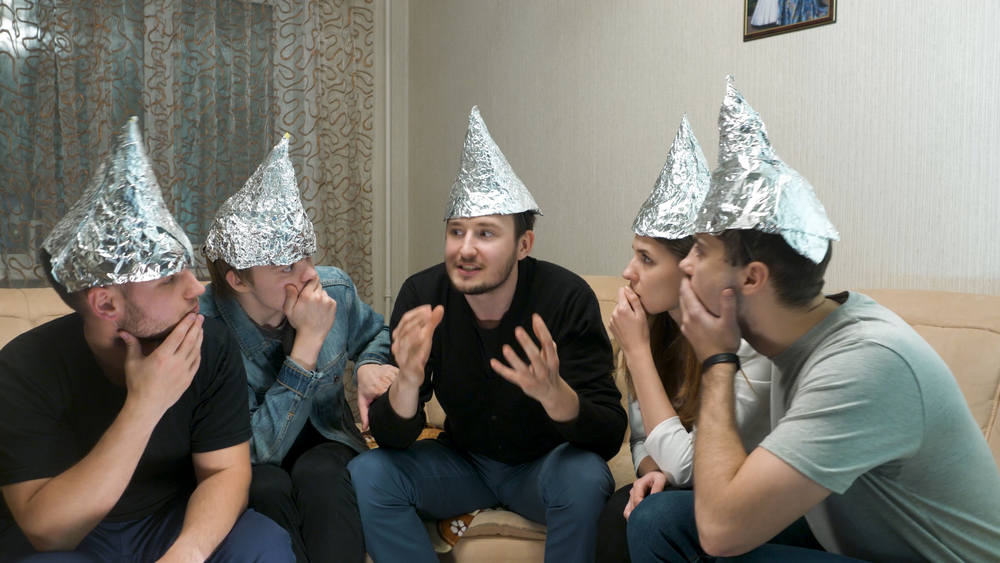I had a patient once. He thought the neighbors were pumping poison gas over the fence. Everyone just accepted that he was bat-shit crazy and didn’t take too much notice of him.

Now claiming conspiracies seems have come a bit of a fashion. They are being spread at the highest levels, by people in positions where their claims can reach – and seemingly be believed - by a large swath of the population.
Some of these are truly fantastic. I have trouble understanding how someone can seriously believe, as QAnon does, that there is an international cabal of Satan worshiping pedophiles run by the leaders of the Democratic party. That Hilary Clinton and Obama are planning a coup. That the spread of corona virus is caused by the 5G network. That COVID-19 doesn’t exist. That 9/11 was sponsored by the US government. That Sandy Hook was contrived to promote gun control.
Or more topical, that wearing a mask causes you to be sick, rather than protects you. That the election was stolen by 2.7 million votes being lost or that there were “huge bags” of ballots that were not counted – or at least not without some more objective evidence than just Giuliani claiming it is so.
Making of a Conspirator
So, I am prompted to wonder about the mindset of people who can believe if not exactly “an evil, unlawful, treacherous, or surreptitious plan formulated in secret” as the dictionary defines a conspiracy. But at least who have “a fixed false belief, that is resistant to reason or confrontation with actual facts” as the psychiatrists define it.
The psychological literature notes that conspiracy believers tend to be distrustful and uncooperative. They reject authority, and movements are grounded in a revolt against “elites and experts” notes Professor of Psychiatry at UCLA, Joseph M. Pierre MD, Writing for Psychology Today,
They tend to be loners and believe they are in possession of secret information, which makes them special and important.
A paper on the American Psychological Associations site Psychnet also notes “narcissism, or a grandiose idea of self, is positively related to belief in conspiracy.” This sounds like a certain prominent public figure. And these people have a “teleologic bias” – meaning they think things happen for a reason, and that they are part of some grand plan - which “brings a comforting certainty and closure.”
My observation is there is a tendency to not be well informed about the technology of things like immunizations that they are opposing. As well as an anti-science bias in general.
There also seems a somewhat paranoid belief in government overreach, or a belief in some nebulous “they” or “them,” - like The Deep State, or The Great Reset – that is going to screw them over.
Many people, but conspirators especially, tend to have a “confirmation bias,” meaning they look for and believe, information that fits with their particular biases. And conveniently overlook evidence that doesn’t.
Beliefs are also very dependent on what source of information a person reads/listens to/watches . There’s a world of difference in what belief gets reinforced if you watch Fox News versus CNN.
People go with the source they agree with and think the sources of people who don’t agree are tainted or are “fake news.” And tend to think anyone not agreeing is just naïve.
And of course, you can get reinforcement of the craziest, most far-out ideas on the Internet, where anyone can post anything. Fact based or not. And hooking up on the Internet with people with the same beliefs is reported to give conspirators a sense of belonging.
De-Conspiriting
The inclination when dealing with someone whose beliefs you think are just crazy, is to tell them that they’re off their trolly, and confront them with masses of evidence. But, as the psychological definition of conspiracy notes, such people are “resistant to reason or confrontation with actual facts”
Dr. Pierre advises, if we want to change “cognitive distortion” we need to deal with it as in Cognitive Behavioral Therapy. We should “first listen empathetically with a goal of understanding.”
So, when there’s someone who frustrates you to the point of you wanting to grab them and shake by the lapels and ask “what the hell’s wrong with you?” don’t’ do it.
It may be far more satisfying, but, as all the talking heads are telling us, there’s an awful lot of reconciliation and peace making needed now in our highly partisan society, so instead placidly hear them out. Listen empathetically.
We need to go with what will re-unify the country rather than what will give us righteous satisfaction.


